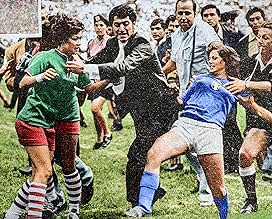Adicionar um enredo no seu idiomaTold by the pioneering women who participated, this is the extraordinary story of the 1971 Women's Soccer World Cup, a tournament witnessed by record crowds that has been written out of spor... Ler tudoTold by the pioneering women who participated, this is the extraordinary story of the 1971 Women's Soccer World Cup, a tournament witnessed by record crowds that has been written out of sporting history - until now.Told by the pioneering women who participated, this is the extraordinary story of the 1971 Women's Soccer World Cup, a tournament witnessed by record crowds that has been written out of sporting history - until now.
- Direção
- Roteiristas
- Artistas
- Prêmios
- 1 vitória e 10 indicações no total
- Direção
- Roteiristas
- Elenco e equipe completos
- Produção, bilheteria e muito mais no IMDbPro
Avaliações em destaque
If this documentary is not nominated to an Oscar or an Emmy, it is a crime.
The subject is quite niche but the undertones of a social statement are there. It's denouncing one of the greatest injustices in sports history. To think this was hidden for so many years just because it was a woman's event it's almost unbelievable.
The first hands stories of these pioneers are grappling and inspiring.
The perspective of those who comment through experience and how they got to the 71 event makes this probably the best sports documentary ever made.
If you believe in social causes, football, or just plain storytelling, this is it.
The subject is quite niche but the undertones of a social statement are there. It's denouncing one of the greatest injustices in sports history. To think this was hidden for so many years just because it was a woman's event it's almost unbelievable.
The first hands stories of these pioneers are grappling and inspiring.
The perspective of those who comment through experience and how they got to the 71 event makes this probably the best sports documentary ever made.
If you believe in social causes, football, or just plain storytelling, this is it.
The 1971 Women's World Cup in Mexico pulled on crowds of 100,000 passionate football fans. Who knew? Well I didn't and that's the point of this documentary, no one does. With an intro from Serena Williams and with many contributors playing in the tournament itself, it's a fascinating account and let's make this clear from the start, it's brilliant. Not just the way it's been put together, which is flawless, but much of the archive footage of the matches is stunning and the football is fabulous. It's a story of repression. Girls and women told that football is not for them and them replying yes it bloody is!! Well, sort of. It's not a tale of out and out rebellion, more a slow burn that started over 100 years ago with girls playing in secret and I guess takes us to present day with players in the WSL becoming household names. The focus here though is Copa 71, the first women's World Cup (still not acknowledged by FIFA) and the players who took that first step. Whether in England, Italy, France, Denmark, Argentina and of course Mexico, the message is the same, let us play. Theres plenty of history, but it goes back much further than the 70s. For instance did you know that in 1917, there were around 100 women's teams in England? How much further we could be if it weren't for doctors... and those are men of course, because women weren't welcome in that world either, saying that football was too dangerous for women and their ovaries. So the FA ban women's football in 1921. Proving that the FA have always been a bunch of idiots. This spreads around the world, but come the 60s enough is enough. It's never gone away, simply forced into the shadows, but here, to a Nancy Sinatra score, woman's football breaks through once more. But why haven't we heard of Copa 71? Well The FA aren't the only idiots of this story and it'll be no surprise to find that FIFA too have their heads stuck up their arses. Nothing's changed there. Not all men are idiots in this story, there are some money grabbing ones too. Off the back of the success of the men's World Cup, Mexico 70. The organisers have a taste for money and think, why not do this again... with women. However, because there's no infrastructure, the football governing bodies around the world refuse to recognise Copa 71 as a World Cup and ignore it. This entire film is bomb blowing apart all that patriarchal oppression, but what's brilliant about it, is the way it puts the players front and centre. They are revolutionaries, they lit the fuse. It's beautiful listening to them talk, reminisce, get choked up as they recall walking into massive stadiums that dwarf many modern structures and are cheered like the heroes they are, but there's ups and downs, winners and losers... it's football. You know what I'm going to say though don't you... there are no real losers here. There is controversy though, again it's football, but the tournament is a hit, both in a sporting nature and commercial clout. It's not just a story about football though. These women were thrust into a volatile situation where the stakes were insanely high, this deftly twists way around each thread of its fascinating narrative. And this is all before we get to the final with a record breaking 110,000 people packed into Mexico City's Azteca Stadium. This had me on the edge of my seat, smiling, utterly gripped. Sadly it's taken far too long for women's football to get the recognition it deserves, but we're finally learning and this film is a valuable lesson. Support women's football and push back against oppressive idiotic male dominated governing bodies who are too stubborn to share the ball. The people on screen here for 90 minutes are an inspiration to us all. A massive thank you to everyone involved in this documentary.
You would have to be mad not to have come to the conclusion that FIFA is populated with grey, humourless, rule-book wielding bureaucrats. And thats not to even mention the corruption, what with the bribes, the thousands of migrant workers dead building large stadiums when a rich desert country with no interest in football was awarded a World Cup or what about when Legia Warsaw unveiled a huge banner to commemorate the murdered 160,000 Poles by the Nazis in the Warsaw Uprising - FIFA's response to this act of education and remembrance? A £42,000 fine for Legia Warsaw of course! But don't worry because this film clearly indicates that FIFA were also 24 carat bell-ends way back in 1971 as well! Well, consistency is a positive attribute of sorts I guess.
This film tells a pretty amazing story in a lot of ways. Amazing because hardly anyone seems to have known a thing about it for 50 years. It's the story of the first women's World Cup which happened way back in 1971. But it doesn't count as the first women's World Cup...because FIFA didn't 'approve' it. Furthermore, they insisted that the Mexican clubs pencilled in to host the thing must under no circumstances do so or face heavy fines. Ironically, their petty intransigence led to the tournament being forced to be played out in the two largest stadiums in the country which were not under FIFA jurisdiction, including the iconic Azteca stadium in Mexico City. Whats actually fairly incredible was that the promoters succeeded epically in selling the tournament and games played out to crowds of 110,000 in an uproarious atmosphere. The competition itself looked amazing and, like the legendary men's World Cup of 1970, clearly benefitted from being played out in such a passionate environment. There are silky skills, 1970's assaults...I mean legitimate tackles, an unfeasibly bad tempered semi-final between Italy vs Mexico where in one photograph we have the brilliantly incongruous sight of an Italian player who looks like Claudia Cardinale being held back from physically assaulting a Mexican opponent, there's a pay strike on the eve of the final, there's amazing goals chalked off for questionable technicalities and its all narrated by gloriously over-the-top Latin football commentary - in other words, its entertainment all the way! The tournament even had a super-cool looking mascot!
So, you may think, this is great - football at its most life-affirming! This will take the game forward! Meanwhile, back in Switzerland...FIFA continued to take the huff. The women received bans, some were barely acknowledged in their own countries for their efforts and many became quickly disillusioned with the game due to some very poor treatment. The tournament was to all intents and purposes buried. The doc is made up of the remembrances of many of the participants from the various competing teams. I found all these women to be full of humour and vitality. They have been treated pretty poorly though. It wasn't until 20 years after this event that the first official FIFA sponsored women's World Cup took place. To me, it seems like a no-brainer for this to now be officially regarded in the history books as the first female World Cup - after all, the first men's one in 1930 was invitation only and that's official. You would think after all the things they have got so epically wrong over the last few years that FIFA could do something positive, do the right thing and make this tournament official...but will they?
This film tells a pretty amazing story in a lot of ways. Amazing because hardly anyone seems to have known a thing about it for 50 years. It's the story of the first women's World Cup which happened way back in 1971. But it doesn't count as the first women's World Cup...because FIFA didn't 'approve' it. Furthermore, they insisted that the Mexican clubs pencilled in to host the thing must under no circumstances do so or face heavy fines. Ironically, their petty intransigence led to the tournament being forced to be played out in the two largest stadiums in the country which were not under FIFA jurisdiction, including the iconic Azteca stadium in Mexico City. Whats actually fairly incredible was that the promoters succeeded epically in selling the tournament and games played out to crowds of 110,000 in an uproarious atmosphere. The competition itself looked amazing and, like the legendary men's World Cup of 1970, clearly benefitted from being played out in such a passionate environment. There are silky skills, 1970's assaults...I mean legitimate tackles, an unfeasibly bad tempered semi-final between Italy vs Mexico where in one photograph we have the brilliantly incongruous sight of an Italian player who looks like Claudia Cardinale being held back from physically assaulting a Mexican opponent, there's a pay strike on the eve of the final, there's amazing goals chalked off for questionable technicalities and its all narrated by gloriously over-the-top Latin football commentary - in other words, its entertainment all the way! The tournament even had a super-cool looking mascot!
So, you may think, this is great - football at its most life-affirming! This will take the game forward! Meanwhile, back in Switzerland...FIFA continued to take the huff. The women received bans, some were barely acknowledged in their own countries for their efforts and many became quickly disillusioned with the game due to some very poor treatment. The tournament was to all intents and purposes buried. The doc is made up of the remembrances of many of the participants from the various competing teams. I found all these women to be full of humour and vitality. They have been treated pretty poorly though. It wasn't until 20 years after this event that the first official FIFA sponsored women's World Cup took place. To me, it seems like a no-brainer for this to now be officially regarded in the history books as the first female World Cup - after all, the first men's one in 1930 was invitation only and that's official. You would think after all the things they have got so epically wrong over the last few years that FIFA could do something positive, do the right thing and make this tournament official...but will they?
"Copa 71" premiered at TIFF last month, and made its US debut at DocFest as part of the Seattle Independent Film Festival. It received rave reviews at both, so it's telling that as of this writing it's currently rocking a 4.5/10 on IMDb for what is probably the most egregious sin of all-- treating women like human beings.
The film has one primary focus, as shown in the title: In 1971, in Mexico City and Guadalajara, a non-FIFA Women's World Cup was held. Six teams were invited, and where the tournament holders imagined it a sideshow, they had dollar signs in their eyes and stadiums to fill (FIFA denied them the use of the regular stadiums, so they were 'forced' into the two largest stadiums in the country).
As a film, its focus is narrow, but that singular focus is so utterly fascinating, and the players so passionate, that this is hardly a complaint. The burial of this sporting event is mentioned barely at all, the film doesn't even make mention of the next (also overlooked) women's tournament in 1985, skipping to the first official FIFA sanctioned event in 1991.
These are minor concerns, as the film is necessary both as an educational tool, and as a historical document. I'm male, I've got a basic familiarity with soccer, but like all great sports documentaries, you can go in blind and be captivated by the story they're trying to tell, regardless. Yes, the open sexism these women had to deal with is still alive and well (see: the current IMDb rating), but that is less the focus than the very real fact that even in 1971, women playing soccer sold out a 110,000 seat stadium.
You can't not love these women, unless you're the unfortunate type of person who never cared for women in the first place. If that's you, you don't need to review bomb, just find something else to be mad about. Women's soccer is the fastest growing sport in the world, and this documentary is a testament that it's been a long time coming.
The film has one primary focus, as shown in the title: In 1971, in Mexico City and Guadalajara, a non-FIFA Women's World Cup was held. Six teams were invited, and where the tournament holders imagined it a sideshow, they had dollar signs in their eyes and stadiums to fill (FIFA denied them the use of the regular stadiums, so they were 'forced' into the two largest stadiums in the country).
As a film, its focus is narrow, but that singular focus is so utterly fascinating, and the players so passionate, that this is hardly a complaint. The burial of this sporting event is mentioned barely at all, the film doesn't even make mention of the next (also overlooked) women's tournament in 1985, skipping to the first official FIFA sanctioned event in 1991.
These are minor concerns, as the film is necessary both as an educational tool, and as a historical document. I'm male, I've got a basic familiarity with soccer, but like all great sports documentaries, you can go in blind and be captivated by the story they're trying to tell, regardless. Yes, the open sexism these women had to deal with is still alive and well (see: the current IMDb rating), but that is less the focus than the very real fact that even in 1971, women playing soccer sold out a 110,000 seat stadium.
You can't not love these women, unless you're the unfortunate type of person who never cared for women in the first place. If that's you, you don't need to review bomb, just find something else to be mad about. Women's soccer is the fastest growing sport in the world, and this documentary is a testament that it's been a long time coming.
This is a great documentary and a must-watch for everyone. I knew about Copa 71 before I watched the movie, but I din't know much of the details. I was crying my eyes out, out of anger and frustration.
At one point, when they interview some of the Argentinian women and they mention how little support they got from their federation, I imediately thought about last weeks news that the now active Argentinian womens team only got a banan and a sandwich for lunch at their last assembly. While progress in womens football has exploded in the last few years it is vital that we all help making sure that every country support the womens team as much as the mens team.
Anyway. Watch this movie and weep. Then rise up and organize.
At one point, when they interview some of the Argentinian women and they mention how little support they got from their federation, I imediately thought about last weeks news that the now active Argentinian womens team only got a banan and a sandwich for lunch at their last assembly. While progress in womens football has exploded in the last few years it is vital that we all help making sure that every country support the womens team as much as the mens team.
Anyway. Watch this movie and weep. Then rise up and organize.
Você sabia?
- CuriosidadesCarol Wilson, who played was the England captain in the tournament, was only 19 years old at the time. Three of her teammates, Leah Caleb (age 13), Gill Sayell (14) and Chris Lockwood (15) were still schoolgirls when they played in the tournament.
Principais escolhas
Faça login para avaliar e ver a lista de recomendações personalizadas
- How long is Copa 71?Fornecido pela Alexa
Detalhes
- Data de lançamento
- País de origem
- Centrais de atendimento oficiais
- Idiomas
- Também conhecido como
- Copa '71 - succén som tystades ner
- Empresas de produção
- Consulte mais créditos da empresa na IMDbPro
Bilheteria
- Faturamento bruto mundial
- US$ 197.067
- Tempo de duração1 hora 30 minutos
- Cor
- Proporção
- 2.00 : 1
Contribua para esta página
Sugerir uma alteração ou adicionar conteúdo ausente

























